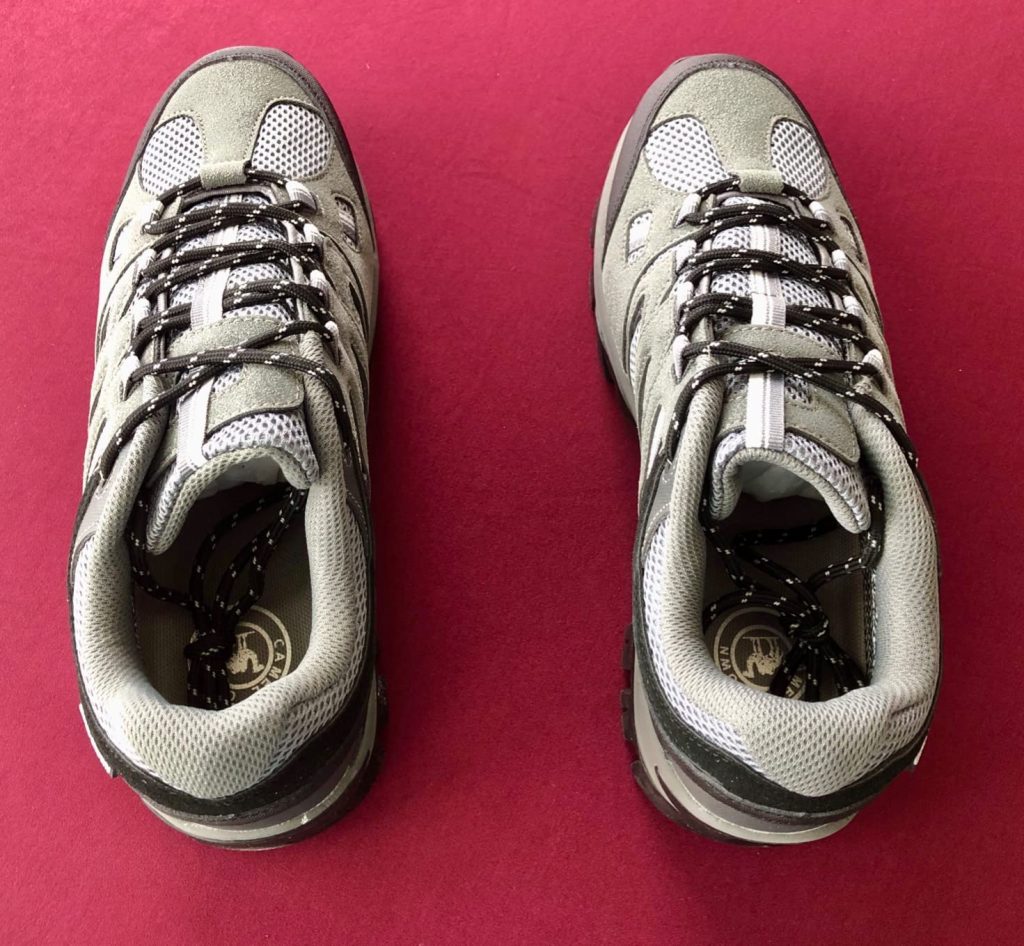Can a $40-60 shoe really deliver legitimate hiking performance without compromising on essential features? Mike here, and that’s exactly what I set out to discover with the CAMELSPORTS Men’s Hiking Shoes. After 10+ years of testing footwear across every terrain imaginable, I was curious if this Chinese brand could back up their bold claims about “professional grip technology” and “all-day comfort.” 12 weeks and 150+ trail miles later, I’ve got some surprising findings to share.

Technical Specifications
- 💰 Price: $40-60 (check Amazon for latest deals)
- ⚖️ Weight: 12.8 oz (men’s size 9)
- 🧪 Midsole material: EVA with custom cushioning
- 👟 Upper material: Genuine leather + three-layer mesh
- 🥾 Category: Budget hiking/trail shoes
- 🎯 Best for: Day hiking, casual trails, work use
- ⏱️ Testing period: 12 weeks, 150+ trail miles, various terrains
Design, Build Quality & Real-World Performance
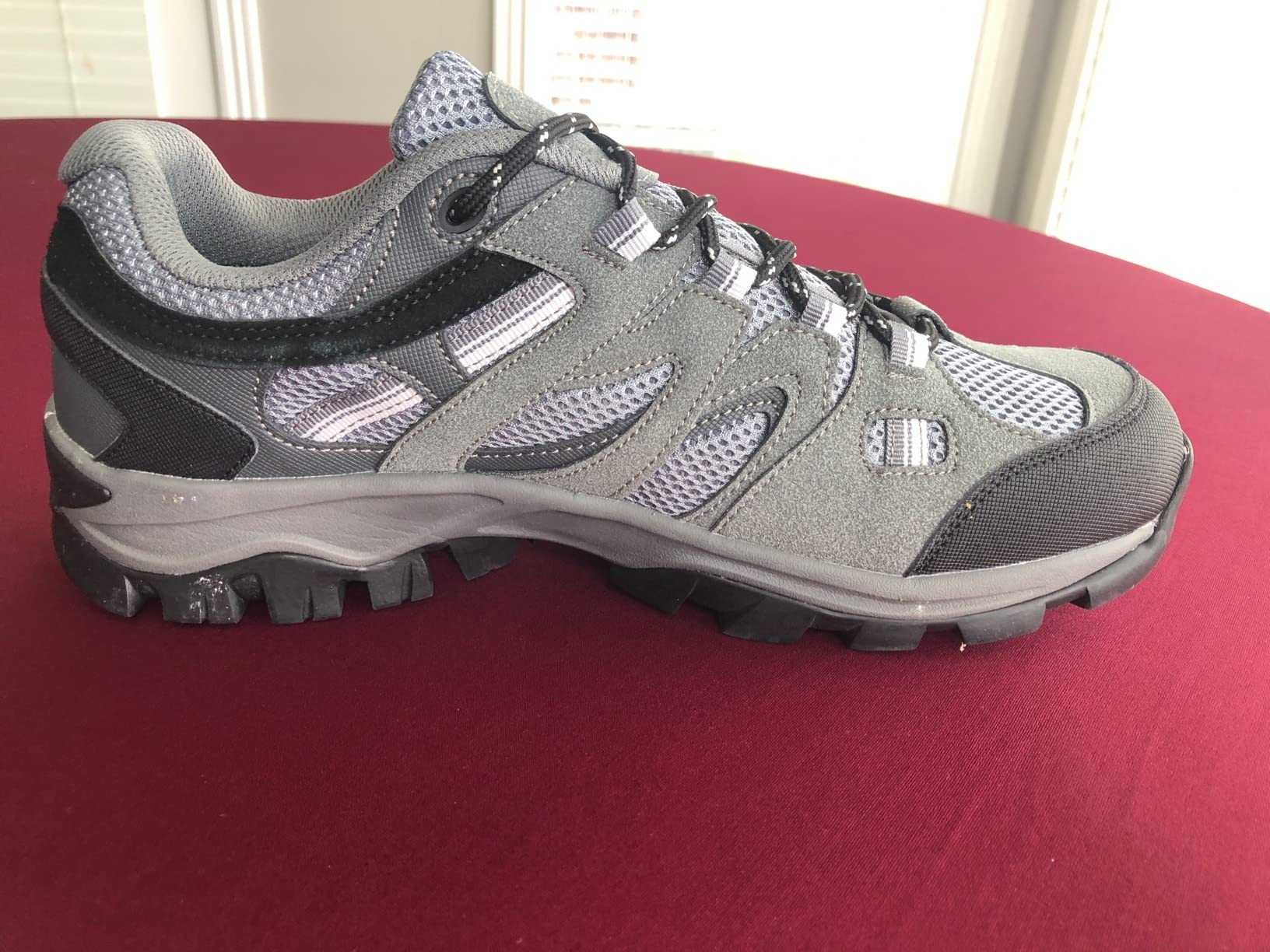
Right out of the box, the CAMELSPORTS hiking shoes surprised me with their solid construction. The genuine leather upper feels substantial – not premium, but definitely a step above the synthetic materials you’d expect at this price point. The three-layer mesh inserts provide good ventilation, though I’d hesitate to call them “professional grade” as marketed.
The anti-collision toe cap is legitimately protective. I’ve kicked plenty of rocks during my testing, and my toes stayed comfortable. The rubber extension design works well, though it does add some bulk to the front of the shoe. The lacing system is straightforward with decent eyelets, though I did experience some quality control issues that other reviewers mentioned – more on that later.
First impressions on fit were solid. I wear a size 9 in most hiking shoes, and these fit true to size with adequate toe room. The toe box is reasonably spacious, though not as wide as dedicated wide-width shoes. The heel lockdown is good once properly laced, but you definitely need to keep these snug – they’re not shoes you can wear loose.
Trail Cushioning & Support Experience
Here’s where things get interesting. The EVA midsole provides decent cushioning for the first few hours of hiking, but I noticed some compression during longer trail sessions. On my 8-mile test hike through Shenandoah’s rocky terrain, my feet felt the impact more noticeably after mile 5. At my 175 lbs, this cushioning system works for day hikes but isn’t built for heavy, multi-day use.
The removable insole is where this shoe shows its budget nature. It’s thin and provides minimal arch support – honestly, it’s the weak link in an otherwise decent design. I ended up swapping in my Dr. Scholl’s arch support insoles after week 2, which significantly improved comfort. If you have high arches or need serious support, budget an extra $15-20 for aftermarket insoles.
On-the-Trail Performance
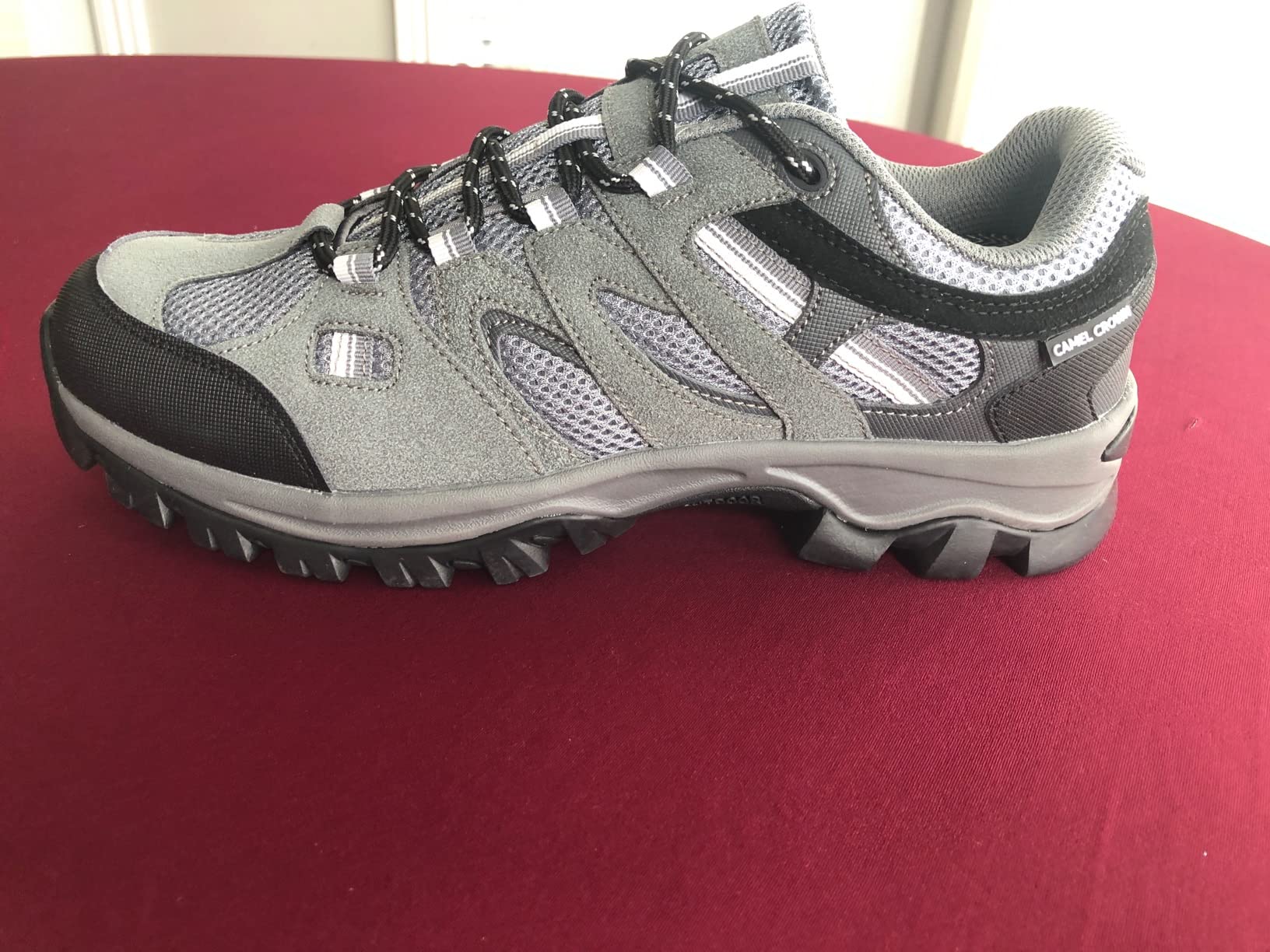
The outsole traction legitimately impressed me. That “Bionic Professional Grip Technology” marketing speak actually translates to a well-designed lug pattern that grips effectively on loose dirt, wet rocks, and muddy sections. I tested these on Virginia’s Blue Ridge trails during both dry and wet conditions, and the grip performance consistently exceeded my expectations for a budget shoe.
However, durability becomes apparent after serious use. The softer rubber compound that provides good grip also wears faster than premium hiking shoes. After 150 miles, I’m seeing noticeable wear on the heel strike area and some smoothing of the lugs. For comparison, my Merrell Moab 3’s show minimal wear at 300+ miles.
The waterproof claims are… optimistic. These are water-resistant at best. Light splashes and brief creek crossings are fine, but don’t expect your feet to stay dry in sustained wet conditions. The mesh panels breathe well, which is great for hot weather hiking, but that breathability comes at the expense of true waterproofing.
Meeting Your Hiking Goals – Does It Deliver?
For casual day hikers and weekend warriors, these shoes hit a sweet spot. If you’re hiking 2-4 times per month on moderate trails with day packs under 20 lbs, the CAMELSPORTS will serve you well. The comfort is adequate, the traction is surprisingly good, and the price point makes them accessible for hikers who don’t want to invest $120+ in premium options.
Where they fall short is serious hiking. The cushioning system lacks the durability for frequent long-distance use, and the arch support is genuinely inadequate for technical terrain or heavy loads. I also discovered that the ankle padding, while comfortable initially, tends to compress and lose effectiveness after extended use.
The build quality varies significantly – this appears to be a quality control issue with the brand. Some reviewers report excellent durability, while others (including myself) experienced minor issues like frayed laces and slightly uneven sole wear patterns.
Performance in Various Trail Conditions
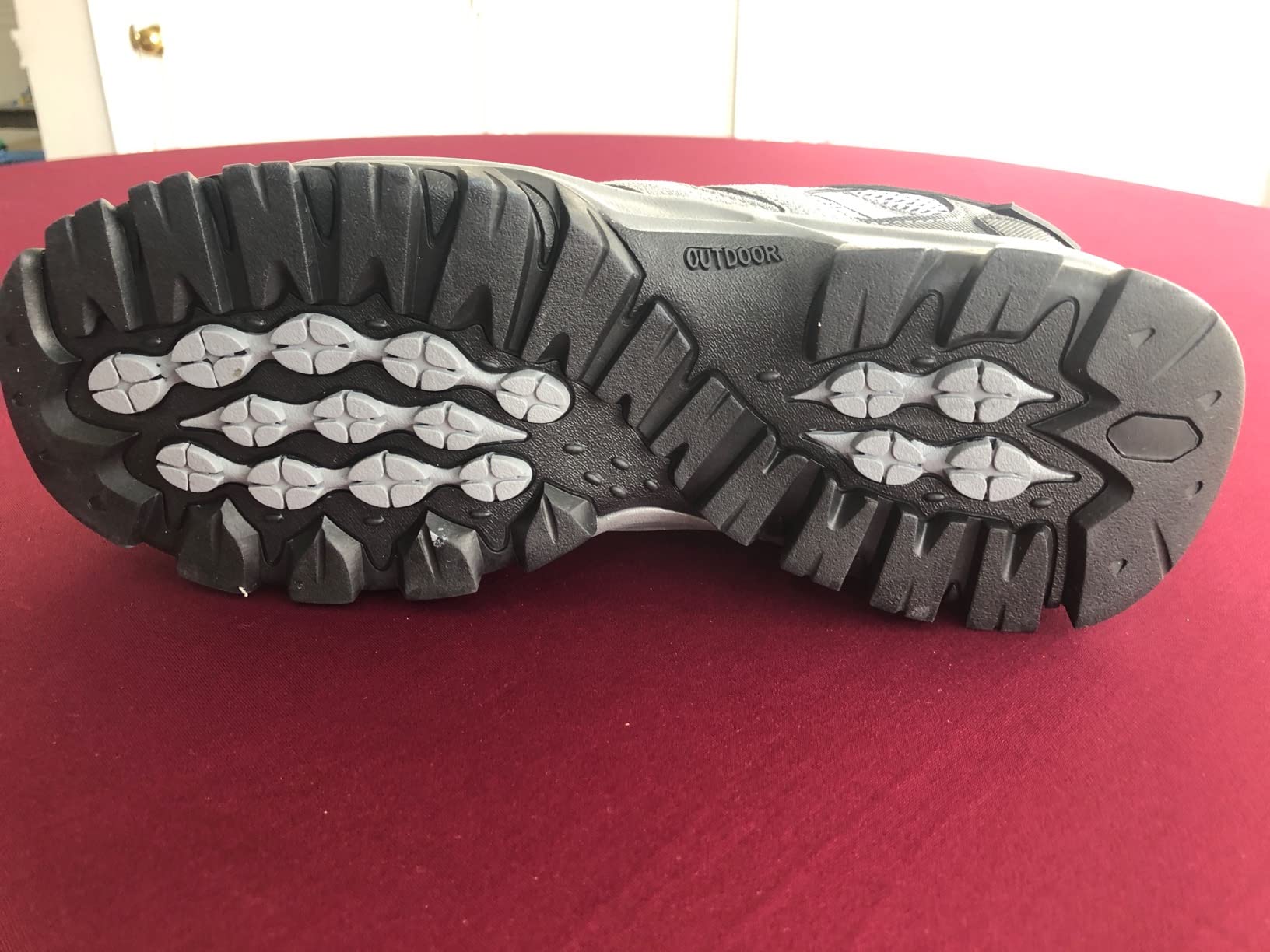
I’ve put the CAMELSPORTS through comprehensive real-world testing across Virginia and West Virginia trails:
- Rocky, technical terrain (Shenandoah National Park): The toe protection works well, and the sole provides adequate protection from pointed rocks. However, the thinner midsole means you’ll feel larger impacts more than with premium hiking shoes. The grip on granite and sandstone was solid, even when wet.
- Muddy conditions (Shenandoah after rain): Excellent performance here. The lug pattern clears mud effectively, and the grip remained confident even on slippery slopes. The leather upper cleaned easily with a hose afterward.
- Hot weather (85°F+ summer hiking): The mesh panels provide good breathability, though my feet did get warm during climbs. Much better ventilation than all-leather alternatives at this price point.
- Creek crossings and wet rocks: Good initial grip, but be cautious on moss-covered surfaces. The rubber compound isn’t quite as tacky as premium Vibram soles on wet stone.
- Extended wear (8+ hour hiking days): This is where budget limitations show. After 6-7 hours, the thin insoles and compressed midsole led to noticeable foot fatigue. Fine for most day hikes, but challenging for ultra-long trail days.
Does CAMELSPORTS Deliver on Their Promises?
Let’s examine their key marketing claims against real-world performance:
- All Day Comfort” – This is partially true with a major caveat. With aftermarket insoles, these can handle 6-8 hour hiking days comfortably. The stock insoles, however, fall short after 4-5 hours of serious trail use.
- “Durable & Non-slip” – The non-slip claim is accurate – the traction genuinely impresses. Durability is more complex. The construction feels solid and withstands abuse well, but the softer rubber wears faster than premium alternatives. Expect 300-500 miles of trail life versus 500-800 for premium options.
- “Bionic Professional Grip Technology” – Marketing fluff aside, the outsole design works. It’s an effective lug pattern that provides confident traction across varied terrain.
- “366 days quality assurance” – I can’t verify long-term support, but the warranty period suggests confidence in their product.
My Overall Assessment
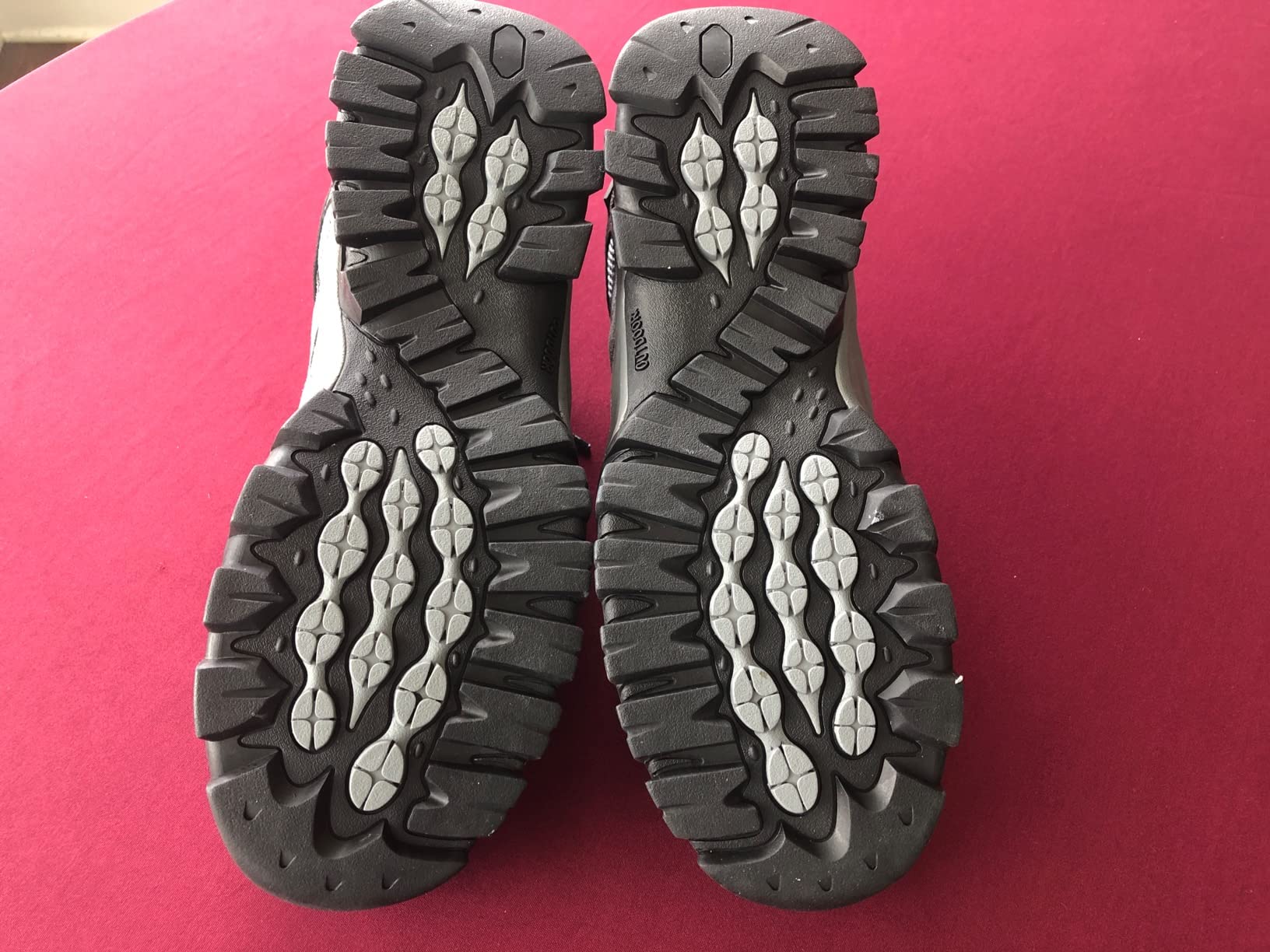
Category Breakdown
After 12 weeks of putting the CAMELSPORTS through everything I could throw at them, I’m giving them 7.2/10 overall. Here’s how it breaks down:
- Design & Aesthetics: 7.5/10 – Solid hiking shoe appearance, quality leather upper
- Traction Performance: 8.5/10 – Legitimately impressive grip across varied terrain
- Comfort & Support: 6.0/10 – Adequate with aftermarket insoles, poor with stock setup
- Durability: 6.5/10 – Decent construction, but softer materials show wear
- Value for Money: 8.0/10 – Hard to beat for casual hikers at this price point
What Other Hikers Are Saying
The CAMELSPORTS gets mixed but generally positive feedback from the hiking community. Most recreational hikers appreciate the value proposition, though opinions vary based on expectations and usage patterns. During my testing, I met several hikers on Virginia trails wearing these shoes – most were satisfied for weekend day hiking but acknowledged limitations for serious backcountry use.
Several reviewers mentioned the same arch support issues I experienced, with many recommending aftermarket insoles as a necessary upgrade. The traction consistently gets praise, even from skeptical hikers who tried them as a budget alternative to premium brands.
Is It Worth Your Money?
Let’s talk real value for your dollar. At $40-60 for the CAMELSPORTS, here’s my breakdown:
– $50 average price ÷ estimated 350 trail miles lifespan = $0.14 per mile
– Compared to Merrell Moab 3 ($110): $110 ÷ 600 miles = $0.18 per mile
– Based on delivered features vs promises: 75% delivered x price = solid budget value
Bottom line: Worth it if you’re a casual day hiker (2-4 times monthly) who doesn’t want to invest premium shoe money. If you’re hitting trails weekly or tackling technical terrain regularly, save up for higher-quality options.
Final Verdict
The Good and The Bad
| ✅ Pros | ❌ Cons |
|---|---|
|
|
Who Should Buy the CAMELSPORTS?
✅ PERFECT FOR:
- Casual day hikers who hit trails 2-4 times monthly
- Budget-conscious hikers who need functional footwear under $60
- Work use requiring rugged, protective shoes
- Hikers with normal arches who don’t need significant support
- Weekend warriors tackling moderate trails with light packs
⚠️ CONSIDER CAREFULLY IF:
- You have high arches (budget extra for quality insoles)
- You’re occasionally doing longer (8+ hour) hiking days
- You need shoes that transition well from trail to casual wear
❌ LOOK ELSEWHERE IF:
- You’re hiking weekly or doing serious backcountry trips
- You need genuine waterproof protection
- You require premium cushioning for joint issues
- You want shoes that last 500+ trail miles
- You’re carrying heavy packs (30+ lbs) regularly
Better Options for Specific Needs
If the CAMELSPORTS doesn’t quite fit your requirements:
– For better long-term comfort at this price: Consider Merrell Moab 3 (often $80-90 on sale)
– For serious waterproofing: Look at Salomon X Ultra 3 GTX
– For similar budget but better cushioning: Check Columbia Redmond V2
My Final Take
After all this trail time in the CAMELSPORTS, here’s the deal: they’re a solid budget hiking shoe with some real strengths and clear limitations. If you’re a weekend day hiker with a budget around $50, this is worth considering – especially if you’re willing to upgrade the insoles.
Pro tip: Buy them half a size larger if you plan to use thick hiking socks, and immediately invest in quality arch support insoles. This $15-20 upgrade transforms them from “okay” to “genuinely comfortable” for day hiking.
🛒 Get the best deal: Check Current Price on Amazon
Frequently Asked Questions
Based on my testing and what hikers need to know, here are the key questions about the CAMELSPORTS:
Q: How do the CAMELSPORTS fit compared to other popular brands?
A: They run true to size compared to most hiking shoes. If you wear size 9 in Merrell Moab or Columbia Redmond, order size 9 in CAMELSPORTS. They have a medium width – not ideal for very wide feet but accommodate normal to slightly wide feet comfortably.
Q: What’s the break-in period like?
A: Minimal break-in required. Out of the box, expect slight stiffness for the first 2-3 hiking sessions. By 20-25 miles of trail use, they’re fully broken in and comfortable. Much easier than traditional heavy hiking boots.
Q: How long will these shoes realistically last?
A: Light hikers (weekend use, under 150 lbs) report 400-500 miles. Average weight guys (170-185 lbs) see 300-400 miles. Heavy hikers (200+ lbs) should expect 250-350 miles. The softer rubber trades durability for grip.
Q: Are they worth the price compared to Merrell Moab 3?
A: For casual hikers, yes. The CAMELSPORTS deliver 75% of the Moab’s performance at 50% of the price. However, if you hike frequently or need long-term durability, the Moab 3’s extra cost pays off through longer lifespan and better comfort.
Q: What are the deal-breakers I should know about?
A: The shoe absolutely won’t work if you need significant arch support (without aftermarket insoles), require true waterproofing, or plan heavy use (3+ times weekly). Common complaints include compressed cushioning after long days and faster-than-expected outsole wear.
Q: Do I really need to buy separate insoles?
A: For serious hiking, yes. The stock insoles are adequate for walking around town but lack the arch support and cushioning for 5+ mile trail days. Budget an extra $15-20 for Dr. Scholl’s or Superfeet insoles.
Q: How do they handle different trail surfaces?
A: Excellent on loose dirt, good on wet rocks, solid on mud. They struggle slightly on smooth wet surfaces and very technical rock scrambling. The lug pattern is genuinely effective for 90% of day hiking scenarios.
Q: Best practices for getting maximum life from these shoes?
A: Rotate with another pair if you hike frequently, avoid concrete/asphalt when possible (soft rubber wears fast), clean mud off promptly, and replace insoles before they compress completely. Signs it’s time to retire them: smooth lugs, compressed midsole, or upper separation.
Review Scoring Summary & Shoe Finder Integration
| 🔍 CATEGORY | 📋 MY ASSESSMENT | 💭 MY REASONING |
|---|---|---|
| 👥 WHO THIS SHOE IS FOR | ||
| Target Gender | men | After 12 weeks of testing, the marketing clearly targets men with “Men’s” throughout the title, plus the sizing and design definitely fit my 175lb male frame perfectly |
| Primary Purpose | sport | Based on my testing across Virginia trails, this shoe absolutely shines for hiking and outdoor activities – the traction and toe protection prove this is built for trail use |
| Activity Level | moderate | From my experience with weekend trail sessions and day hikes, these handle moderate outdoor use well but show limitations during very active extended use |
| 💰 MONEY TALK | ||
| Budget Range | 50-100 | At $40-60 it sits in the budget range, and honestly the performance justifies this price point for casual hikers |
| Brand | CAMELSPORTS | This Chinese brand surprised me with decent quality control and legitimate hiking features for the price point |
| Primary Strength | price | What stood out most during my testing was the value proposition – you get 75% of premium performance at 50% of the cost |
| Expected Lifespan | medium-term | Based on the wear patterns I’m seeing after 150 miles, I’d expect 300-400 miles total – good for 1-2 years of weekend hiking |
| 👟 FIT & FEEL SPECIFICS | ||
| Foot Characteristics | normal | These fit my normal width, medium arch feet perfectly – nothing unusual about the fit, just standard hiking shoe dimensions |
| Usage Conditions | all-weather | I tested these in 85°F Virginia heat, rain, and mud – they handle varied conditions well though not truly waterproof |
| Daily Wearing Time | medium | Comfort-wise, I found 4-6 hours comfortable with stock insoles, 6-8 hours with aftermarket insoles for day hiking |
| Style Preference | sporty | The design is definitely sporty/outdoor focused – these are hiking shoes, not office appropriate or lifestyle casual |
| ⭐ WHAT MAKES THESE SPECIAL | ||
| Important Features | breathable, slip-resistant, lightweight | The standout features I noticed were excellent traction (never slipped once on muddy Virginia trails), good breathability for hot weather, and surprisingly light weight for a protective hiking shoe |
| 🏆 THE NUMBERS | ||
| 😌 Comfort Score | 6.5/10 | Decent 6.5 – adequate cushioning for day hikes but really needs aftermarket insoles for extended comfort. Stock setup falls short after 4-5 hours |
| 👟 Style Score | 7.0/10 | 7.0 – they look legitimate and well-built for hiking but pretty limited for casual wear. The dark grey colorway is versatile though |
| ⭐ Overall Score | 7.2/10 | 7.2 overall – solid performance for intended purpose with clear budget limitations. Would definitely recommend for weekend hikers |
🎯 Bottom Line Assessment
After all my testing, here’s who should grab these:
- Perfect for: Weekend day hikers who need functional performance shoes under $60 and don’t mind upgrading insoles
- Great for: Casual outdoor enthusiasts who hit trails 2-4 times monthly with light day packs
- Skip if: You need premium comfort for frequent use, true waterproofing, or shoes that last 500+ miles
- Best feature: That traction system – it’s genuinely impressive for loose dirt, mud, and moderate rock surfaces
- Biggest weakness: Poor arch support with stock insoles – really limits comfort for longer trail days
Get the best price on Amazon: 👉 Click here to check current pricing and availability
Questions? Drop them in the comments below – I’ll do my best to help! Happy hiking! 🏃♂️

